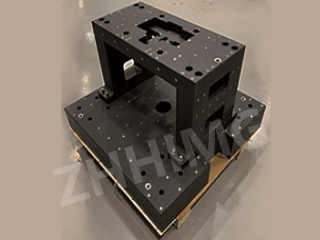When it comes to the construction of a universal length measuring instrument, the machine base is one of the most critical components. A machine base plays a crucial role in ensuring the accuracy and precision of the measurement instrument. The choice of materials for the machine base is therefore very important and can make a significant difference in the performance of the instrument. There are several materials that can be used for the construction of a machine base, but in this article, we will discuss why granite is a better option than metal.
Granite is a natural rock that is widely used in the construction industry, especially for building foundations, bridges, and monuments. Granite has superior properties that make it an ideal material for a machine base. Here are some of the reasons why granite is a better choice:
1. High Stability
One of the main advantages of granite is its high stability. Granite is a hard and dense material that does not easily flex or deform under load. This means that it can provide a very stable support for the measuring instrument, ensuring that it remains in a fixed position during the measurement process. This is particularly important when dealing with highly accurate and precise measurements.
2. Good Damping Characteristics
Another advantage of granite is its good damping characteristics. The density and hardness of granite make it an excellent material for absorbing vibrations and shock waves. This is important in a measuring instrument because any vibration or shock can affect the accuracy of the measurements. Granite dampens any vibrations significantly, resulting in more accurate and precise readings.
3. Thermal Stability
Granite has low thermal expansion characteristics. This means that it will not expand or contract significantly due to changes in temperature. This makes granite an ideal material for a machine base as it ensures that the measuring instrument remains stable in any temperature environment. In contrast, metals expand and contract more rapidly with temperature changes, leading to measurement inaccuracies.
4. Non-Magnetic
Some measuring instruments require a non-magnetic base to prevent any interference with the measurement. Granite is non-magnetic, which makes it an ideal choice for instruments that require non-magnetic support.
In conclusion, granite is a superior material for a machine base for universal length measuring instruments due to its high stability, good damping characteristics, thermal stability, and non-magnetic properties. The use of granite will result in more accurate and precise measurements, providing greater confidence in the measurement results.
Post time: Jan-22-2024

